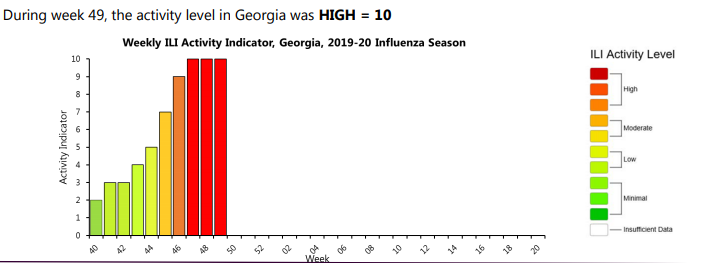Nationwide, the Centers for Disease Control and Prevention (CDC) estimates that so far this season there have been at least 2.6 million flu-related illnesses and 1,300 deaths from flu.
The Georgia Department of Public Health (DPH) has confirmed more than 200 hospitalizations and two flu-related deaths.
The predominant flu virus currently circulating is a B/Victoria strain that doesn’t usually pop up until the end of the flu season, in early spring. B viruses can infect anyone, but they generally strike children and young adults more than the elderly. Vaccination is the best prevention against the flu for all ages, and the B/Victoria strain is included in this season’s vaccine.
“Every individual over the age of six months should get a flu vaccine – not just for their own protection, but to protect others around them who may be more vulnerable to the flu and its complications,” says Kathleen E. Toomey, M.D., M.P.H., DPH commissioner. “It takes about two weeks after vaccination for antibodies that protect against flu to develop in the body, so now is the time to get a flu shot.”
Flu symptoms and their intensity can vary from person to person, and can include fever, cough, sore throat, runny or stuffy nose, body aches, headache, chills and fatigue. If you think you have the flu, call or visit your doctor.

There are other things you can do to help prevent the spread of flu – tried and true measures your mother taught you.
- Frequent and thorough hand-washing with soap and warm water. Alcohol based gels are the next best thing if you don’t have access to soap and water.
- Cough or sneeze into the crook of your elbow or arm to help prevent the spread of the flu.
- Avoid touching your face as flu germs can get into the body through mucus membranes of the nose, mouth and eyes.
- If you are sick, stay home from school or work. Flu sufferers should be free of a fever, without the use of a fever reducer, for at least 24 hours before returning to school or work.
- If you are caring for a sick individual at home, keep them away from common areas of the house and other people as much as possible.
Weekly Flu Report 201949
To learn more about influenza log on to https://www.cdc.gov/flu/.
Nelda Smith
January 4, 2020 at 10:42 am
STOP THE FLU VACCINES UNTIL THEY HAVE BEEN TESTED FOR EVERY INGREDIENT AND ALL UNNECESSARY INGREDIENTS REMOVED ! WE DO NOT NEED FORMALDEHYDE, ALUMINUM, HEK-293 (9 WK. FETAL MALE HUMAN EMBRYO KIDNEY) AND MANY OTHER POISONS PUMPED INTO OUR BODIES! NO WONDER PEOPLE ARE SICK !
Nelda Smith
January 4, 2020 at 11:47 am
HOW MANY OF THOSE 200 HOSPITAL PATIENTS HAD TAKEN FLU SHOTS PRIOR TO BECOMING ILL? DID THE 2 THAT DIED HAVE PRIOR FLU SHOTS?